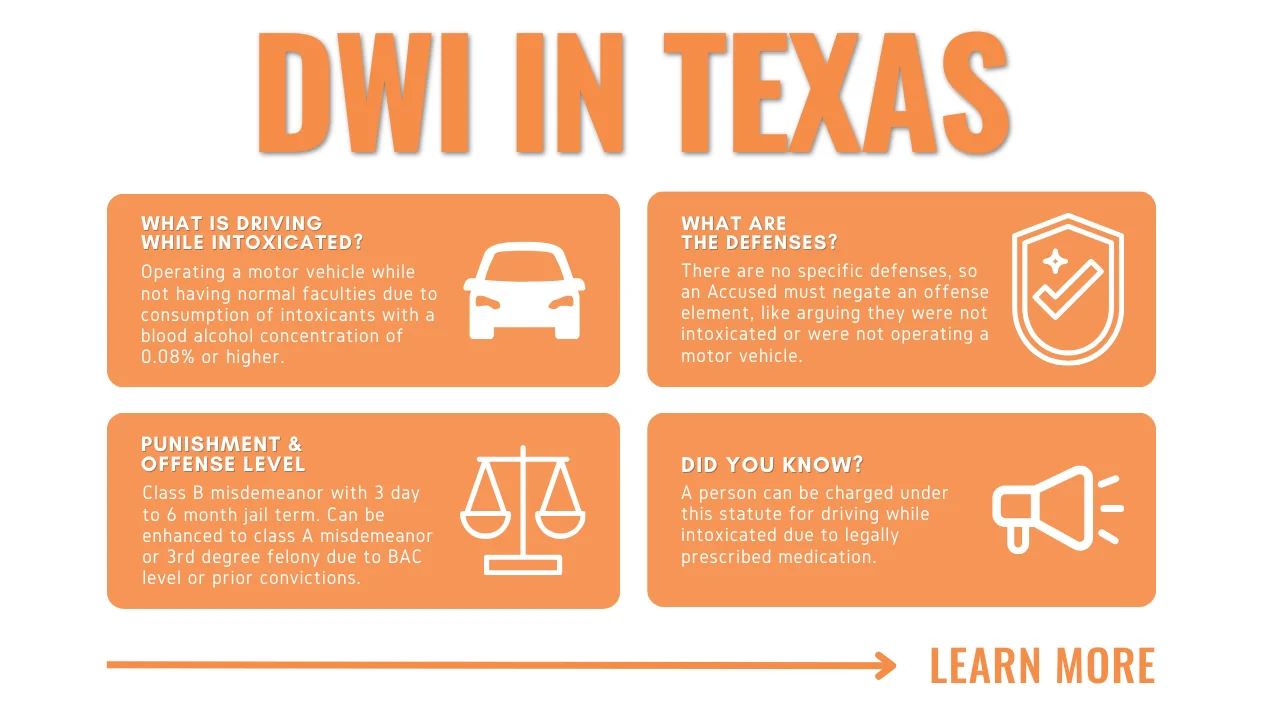
WHAT HAPPENS WHEN A PILOT GETS A DWI IN TEXAS?
Pilots are subject to severe DWI penalties upon arrest but face the added danger of losing their pilot’s license. Federal Aviation Administration (FAA) regulations require pilots to report any DWI conviction or related driver’s license suspension or suffer a suspension of any certificate, rating, or authorization issued by the administration. Additionally, pilots with two or more DWI offenses in three years are subject to an immediate suspension of their pilot’s license in Texas.
- What happens if an airline pilot gets a DUI? In addition to imperiling their pilot’s license, airline pilots can lose their employment if they get a DUI in Texas. Commercial airlines have strict policies against convicted drunk drivers, primarily for public relations and civil liability purposes. A strong DWI defense can help a Texas pilot avoid a conviction and also build a compelling mitigation case to assuage substance addiction concerns.
- When to report DWI to FAA? Texas pilots must report a DWI conviction and any related driver’s license suspension, including an ALR suspension, within 60 days of the event. Title 14, Section 41.15 of the Code of Federal Regulations requires this notice in writing directed to FAA, Civil Aviation Security Division (AMC-700), P.O. Box 25810, Oklahoma City, OK 73125. The report must include:
-
- The person’s name, address, date of birth, and airman certificate number;
- The type of violation that resulted in the conviction or the administrative action;
- The date of the conviction or administrative action;
- The State that holds the record of conviction or administrative action; and
- A statement of whether the motor vehicle action resulted from the same incident or arose out of the same factual circumstances related to a previously reported motor vehicle action.
Pilots are not required to report a DWI arrest to the Federal Aviation Administration but they must report a DWI conviction and any related driver’s license suspension. Failure to report these events as required is grounds for suspension of a pilot’s license.
IS IT ILLEGAL FOR A PILOT TO BE DRUNK?
Yes, it is illegal for a pilot to be intoxicated while operating a motor vehicle, watercraft, or aircraft in Texas. Flying While Intoxicated is subject to severe penalties in Texas including jail, thousands of dollars in fines, suspended licenses, and a permanent criminal conviction.
It is also illegal for pilots to appear in public while intoxicated to the degree they endanger themselves or others. Public Intoxication is a class C misdemeanor subject to a maximum $500 fine.
These offenses create suspicion of an unresolved substance abuse addiction which can compromise a pilot’s flying privileges.
- What happens if a pilot is caught drunk? Pilots who are caught drunk are subject to arrest, criminal prosecution, and may be temporarily grounded while their cases proceed in court. Federal regulations require pilots to report drunk driving convictions and related driver’s license suspension to the FAA and their employers in certain circumstances. Convictions for Driving While Intoxicated, Flying While Intoxicated, and repeat offenses can lead to suspension of a pilot’s medical certificate, which is required for their pilot’s license.
- What happens if a pilot gets caught drinking? The FAA prohibits pilots from performing crew member duties within 8 hours after drinking alcohol. Violating this prohibition can lead to the pilot’s firing and a suspension of their pilot’s license in Texas.
DO PILOTS HAVE TO PASS A BACKGROUND CHECK?
Yes, pilots are subject to extensive and multiple background checks, including FBI fingerprint checks, at several points throughout their careers.
- Can pilots have a criminal record? Yes, pilots can have certain criminal records. Convictions for drug offenses, DWI, and Flying While Intoxicated are grounds for suspension of a pilot’s FAA certificate and denial of their application for up to 1 year after the date of conviction.
- Can you be a pilot with a DUI? Yes, although an aspiring pilot may be required to wait up to 1 year after a single DUI conviction before their application is accepted. Repeat offenders are subject to a different standard. A history of multiple DUI and drug offenses will complicate getting an FAA medical certificate, which is required to obtain and maintain a pilot’s license.
HOW FAR BACK DO FAA BACKGROUND CHECKS GO?
All the way back. The Federal Aviation Administration conducts exhaustive background checks which review the entirety of an applicant’s criminal history.
- How far back does FAA check for DUI? All the way back as well. Even 30-year-old DUI cases are subject to disclosure on an FAA background check.
- How long does DWI stay on record in Texas? DWI cases stay permanently on criminal records in Texas even when dismissed. There is a common misconception that certain charges automatically fall off or disappear from a person’s background check after several years. This is inaccurate information. The only way to remove a DWI record is by expungement in Texas.
WHAT SHOWS UP ON A FAA BACKGROUND CHECK?
A candidate’s entire criminal history will show up on an FAA background check. This includes records of arrest, probation, deferred adjudication, jail sentences, and even dismissals. The only way to clear these records in Texas is by expungement.
- Does the FAA care about misdemeanors? Yes, the FAA can deny or suspend a pilot’s license for misdemeanor drug offenses and repeat alcohol crimes.
- How long does an FAA violation stay on your record? FAA Administrative Actions, like a letter of reprimand, correction, and warning notices, can stay on a pilot’s record for up to two years. FAA Legal Enforcement Actions, such as suspensions and revocations, stay on a pilot’s record permanently unless they were expunged prior to November 1, 2010.
CAN THE FAA SEE EXPUNGED RECORDS?
No, the FAA cannot see properly expunged criminal records. Expungement is a nuanced legal process and should be handled by an experienced professional. An improperly expunged record may still appear on an FAA background check.
- What are the FAA requirements for DUI? The Federal Aviation Administration requires pilots to notify the agency in writing within 60 days following a DUI or DWI conviction. Pilots must also notify the agency within 60 days of a driver’s license suspension related to the operation of a motor vehicle while intoxicated by alcohol or drug. This second requirement includes Texas Department of Public Safety administrative license suspensions. Pilots are not required to report a DWI arrest unless it results in a conviction or driver’s license suspension.
- What is the FAA HIMS program? The FAA Human Intervention Motivational Study (HIMS) is a substance abuse therapy treatment program specifically designed for pilots. The HIMS program is formulated for physicians and medical examiners to identify and assist aviators with potential substance dependence diseases so they may be treated and maintain their careers.
WHAT WILL DISQUALIFY YOU FROM BEING A PILOT?
Felony drug convictions and a history of DWI or alcohol-related crimes are disqualifiers for pilots as the FAA views substance dependency as hazardous for pilots entrusted with the safety of their passengers and crews. Therefore, individuals with debilitating cardiovascular, neurological, or psychological health disorders may also be disqualified from obtaining the required FAA medical certificate.
- Can the FAA send you to jail? No, FAA enforcement actions normally only involve monetary fines or license suspensions.
- Can I get an FAA medical with a DUI? Yes, though aspiring aviators are required to demonstrate they do not have a substance abuse disorder which compromises their fitness as a pilot. Applicants with multiple DUI convictions will therefore have a difficult task proving they are of sound faculties and sobriety. Applicants should be prepared to wait one year following a DUI conviction before seeking FAA certification.
HOW LONG DO YOU HAVE TO REPORT DUI TO FAA?
Pilots must report a DUI or DWI conviction or related driver’s license suspension within 60 days following the event. This report must be submitted in writing to the FAA office in Oklahoma City. Pilots are not required to report a DWI arrest unless it results in a conviction or leads to a driver’s license suspension.
- What level of DUI can pilots get? Any DUI case is of immediate concern for pilots in Texas. Federal policy imposes nuanced reporting requirements and some pilots must even notify their employers upon arrest. Additionally, pilots with multiple DWI offenses are particularly susceptible to revocation of their medical certificates. Pilots facing DWI charges in Texas should immediately consult an experienced DWI lawyer and criminal defense law firm to avoid the most severe of these collateral consequences.
WHAT IS THE FAA ALCOHOL TOLERANCE?
The FAA alcohol tolerance is 0.04. Pursuant to federal regulations, no person (including pilots) may act or attempt to act as a crewmember with a BAC of 0.04 or greater. The FAA alcohol tolerance is lower than the common 0.08 BAC limit for operating a motor vehicle, which underscores the administration’s strict sobriety requirements.
- What is the alcohol rule for pilots? The alcohol rule for pilots is found in 14 CFR § 91.17. This regulation prohibits pilots from operating or attempting to operate an aircraft:
-
- Within 8 hours after the consumption of any alcoholic beverage;
- While under the influence of alcohol;
- While using any drug that affects the person’s faculties in any way contrary to safety; or
- While having an alcohol concentration of 0.04 or greater in a blood or breath specimen. Alcohol concentration means grams of alcohol per deciliter of blood or grams of alcohol per 210 liters of breath
- Do pilots have to take a breathalyzer? Yes, pilots cannot refuse a breathalyzer test. Under 14 CFR § 61.16 pilots are required to take a breathalyzer test or blood test upon request. Refusal to submit to a breath or blood alcohol test is grounds for denial of an FAA certificate application for one year and suspension of any current FAA certificate, rating, or authorization, including a pilot’s license.
WHAT IS THE ALCOHOL LIMIT FOR PILOTS?
Federal aviation regulations prohibit pilots from acting or attempting to act as an air crewmember while under the influence of alcohol or while having a BAC of 0.04. This language creates a strict standard which means pilots under even just the visible influence of alcohol are subject to FAA sanctions including a potential suspension of their medical certificate.
Additionally, pilots with a Blood Alcohol Content of 0.08 or greater are subject to criminal prosecution for Flying While Intoxicated, an enhanceable class B misdemeanor in Texas.
- How long do pilots have to be sober? Pilots must be completely sober for at least 8 hours before operating or attempting to operate an airplane.
- What is the 8 hour bottle to throttle rule? The 8 hour “bottle to throttle” rule is found in Title 14, Section 91.17 of the Code of Federal Regulations. This provision prohibits pilots from acting or even attempting to act as air crew within 8 hours after consuming alcoholic beverages. Violating this provision is grounds for suspension of any FAA certificate, authorization, or rating, including medical certificates and pilot’s licenses.
CAN YOU GET HIRED AT AN AIRLINE WITH A DUI?
Yes, certain airlines will hire a pilot if the pilot has a DUI so long as they have a valid medical certificate and are otherwise in good standing with the FAA. Commercial airlines can reject candidates for reasons like unresolved substance abuse issues. Airline employment candidates should therefore be prepared with mitigating factors to demonstrate the absence of any chemical dependency.
- Can airline pilots have criminal records? Yes, provided their medical certificate and pilot’s license is valid and they are in compliance with the FAA. Certain airlines are more discerning than others and may reject pilots for criminal records that reflect poorly on their fitness and integrity.
- Do airlines hire felons as pilots? Felons are eligible for employment with airlines as a felony is not an automatic FAA medical certificate or pilot’s license disqualification. For all practical purposes, some felons are treated more severely, including those with convictions for Theft, Bribery, Money Laundering, domestic violence, controlled substances, fraud, and Assault/deadly weapon offenses. Commercial airlines can pick and choose among eligible pilots and are free to reject felons as not representative of good moral character and their desired brand, for example.
WHAT IS THE CHARGE FOR FLYING DRUNK?
The charge for flying drunk is Flying While Intoxicated in section 49.05 of the Texas Penal Code. Flying While Intoxicated is an enhanceable class B misdemeanor punishable by imprisonment, thousands of dollars in fines, and a permanent criminal conviction in certain circumstances. This offense can potentially also result in a suspension of a Texas driver’s license and an FAA pilot’s license.
- What happens if a pilot refuses to submit to a blood alcohol test? There are two things that can happen if a pilot refuses to submit to a blood alcohol test.First, a pilot is immediately subject to an Administrative License Revocation (ALR) proceeding hearing, which can result in a Texas Department of Public Safety driver’s license suspension. This is part of the Texas Implied Consent law. Pilots are required to report any such suspension to the administration or risk further FAA punishment and sanctions.
Perhaps more importantly for Texas aviators, a blood alcohol test refusal is also grounds for suspension of an FAA medical certificate and pilot’s license.
- What happens if a pilot refuses a drug test? Pilots who refuse drug tests risk a denial of an application for an FAA medical certificate for one year and a suspension of any current medical certificate and pilot’s license.
DO PILOTS GET FIRED IF THEY GET A DUI?
Yes, airline transport pilots can get fired for a DUI even though a DUI is not an automatic pilot’s license disqualification. Commercial airlines can simply decide retaining such an individual is not conducive to their brand and fire the pilot.
- Can I be a pilot with 2 DUI’s? Yes, though the candidate must wait one year after the most recent date of conviction. The process is challenging and applicants must demonstrate they have no unresolved substance abuse addiction to obtain the required medical certificate for a pilot’s license.
- Do you lose your pilot’s license with a DUI? A first-time DWI is not grounds for an automatic pilot’s license suspension. Pilots are required to report a DWI conviction and any related driver’s license suspension to the FAA. Pilots who neglect this reporting requirement are subject to revocation of their pilot’s license. Additionally, multiple DUI convictions are grounds for suspension of a pilot’s license as well.
TOP TEXAS DWI LAWYERS FOR PILOTS
Trey Porter Law provides powerful representation for pilots facing intoxication and DWI charges across Texas. Results matter most when your freedom and future are on the line. Trey Porter Law brings over 40 years of combined experience, strategic knowledge, and a hard-earned reputation of winning to every case the firm takes on. The top-rated lawyers at TPL have a steadfast commitment to uncompromising results.



















